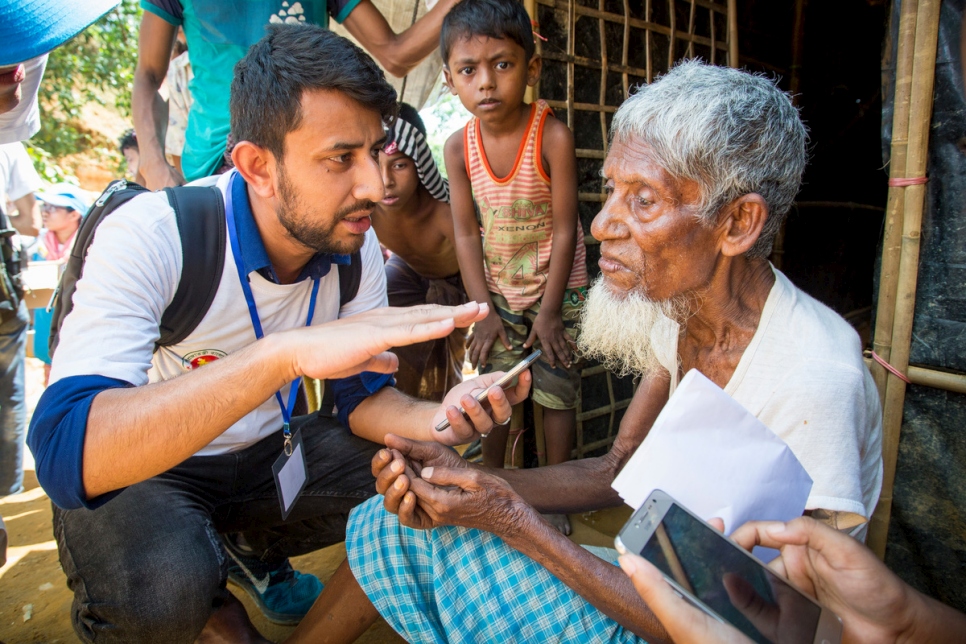Family count gives shape to refugee population in Bangladesh
UNHCR teams gather baseline data to help thousands of Myanmar refugees.

UNHCR volunteer Zakia Kabir collects information from Rohingya grandmother Dolu, 75, and her daughter Reza, 45, using a data-gathering smartphone app that helps to streamline assistance at the Kutupalong extension site. © UNHCR/Roger Arnold
KUTUPALONG CAMP EXTENSION, Bangladesh – Seventy-five-year-old Rohingya refugee Dolu comes to the opening of her shack and speaks with a smartphone-toting data collector working for UNHCR, the UN Refugee Agency.
Giving her name, place of origin and the number of people present in her household, among other details, Dolu is handed a yellow laminated card with a unique Family Count Number assigned by the Bangladesh government.
Then the GPS location is logged in an app, and a photo taken of Dolu and her daughter Reza, 45. A matching card is zip-tied to the bamboo frame of the plastic roofed shack she now calls home.
“Finally, I have an address,” Dolu says. “I’m old, I’m sick and I’m tired of moving. My life will be stable now.”
“Finally, I have an address. I’m old, I’m sick and I’m tired of moving.”
The mother and daughter are among more than half-a-million women, girls, men and boys who have fled Myanmar since late August. Most have settled in sprawling pop-up cities that have sprung up between Kutupalong refugee camp and its sister, Nayapara, in southeast Bangladesh.
The family count began on Wednesday (October 4) and is being carried out by 120 “enumerators” divided up in to 10 teams. Fanning out through the shanties, they aim to tally around 105,000 households – a total of 525,000 people, assuming five individuals to each home – over a two-week period.
“With such a huge population, data is vital for distributing assistance – whether it’s food aid, kitchen sets, shelter kits or anything else,” says Laura Giammarinaro, a senior UNHCR registration officer working on the drive.
”If you don’t know who people are, their family, how many they are and where they are, it is not possible to do it in an organized, efficient way,” she adds.

A UNHCR contractor collects information from Mohammad Busho, 80, using a data-gathering smartphone app that helps to streamline assistance at the Kutupalong extension site, Bangladesh. © @UNHCR/Roger Arnold
The count began in the Kutupalong Camp Extension and the adjacent Balukhail Extensnion, both of which were selected by the Bangladeshi authorities.
The areas have been mapped and divided into zones and blocks (Dolu and Rezema’s new address is Zone 1, block 5). As the count gets underway, UNHCR is working closely with refugee community leaders who provided lists of residents and where, roughly, to find them.
Aside from assigning aid, it is hoped that the count will prove key to protecting the vulnerable in the chaotic tangle of shacks, which sprawl up and down hillsides here and stretch as far as the eye can see.

Bangladesh: Counting Rohingya families, using innovation to target UNHCR aid (Martin Seemungal, producer / Médéric Droz-dit-Busset, editor)
“Finding people out there is a huge challenge. So with this, we’ll know where the family is and its composition and if they have protection needs,” says Giammarinaro.
“That way people who are trained can go back to this family, so they will be able to see, for example, the shack where unaccompanied children, single parents or people with disabilities are living. They’ll know where they are.”
A little further down the dirt pathway from Dolu, newly counted father-of-four Jafur Alam straightaway sees that the card could help him. He is looking for his 17-year-old daughter, who became separated from the family in the settlement days earlier, and he has not seen her since.
“If I give my (unique family identification) number to the authorities, they can locate me when they find her,” he says.
"With this, we’ll know where the family is and its composition and if they have protection needs.”
It is estimated that around one million Rohingya are stateless. Aside from its practical benefits, the card is also providing a small measure of identity to the refugees.
“I’ve never had a card like this before,” says Mohammad Busho, 80, sitting at the entrance to his family’s humble shelter in Zone 1, Block 5. “Maybe now we will get some help.”
Your support is urgently needed to help the children, women and men refuges in Bangladesh. Please give now.
